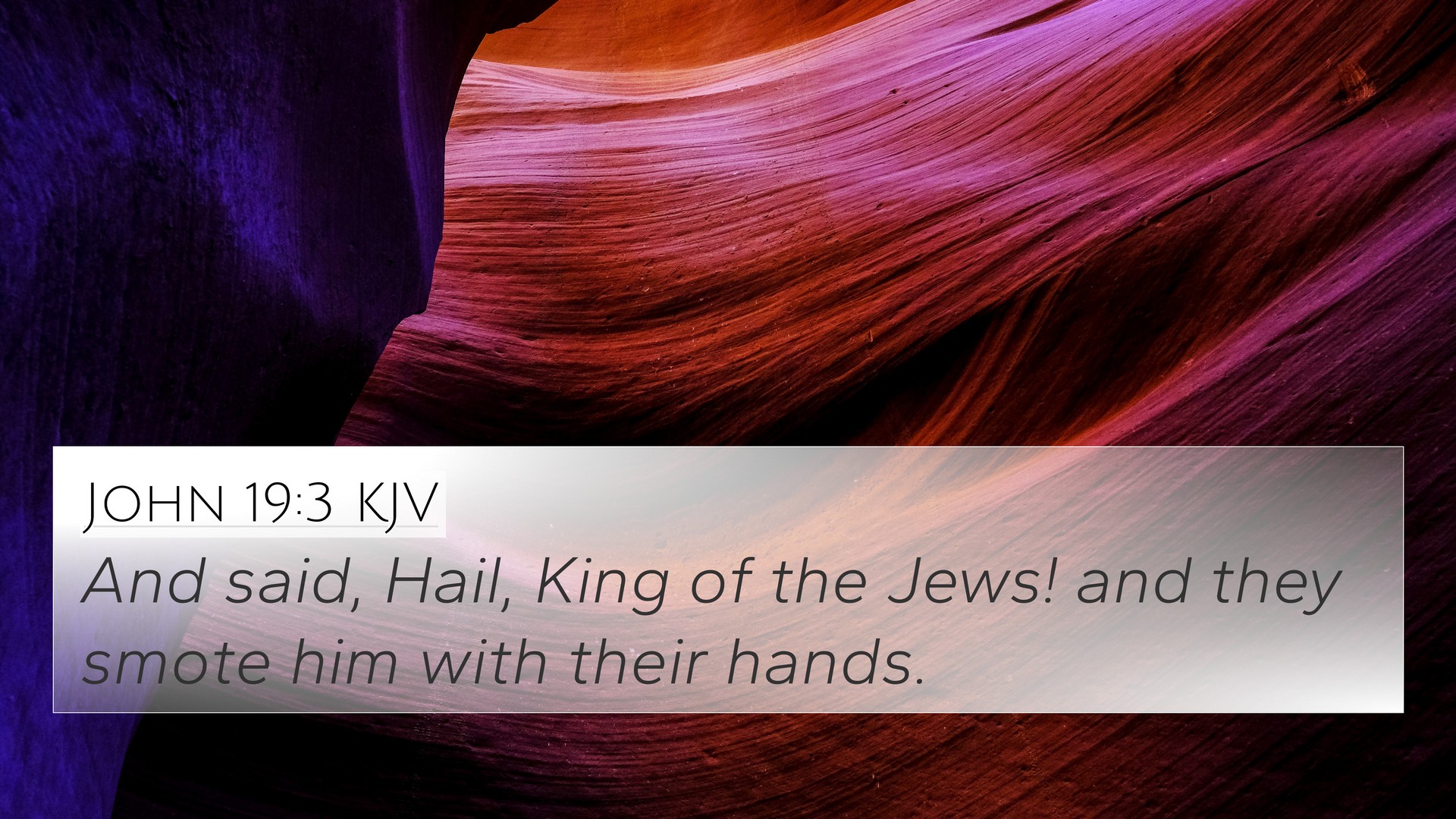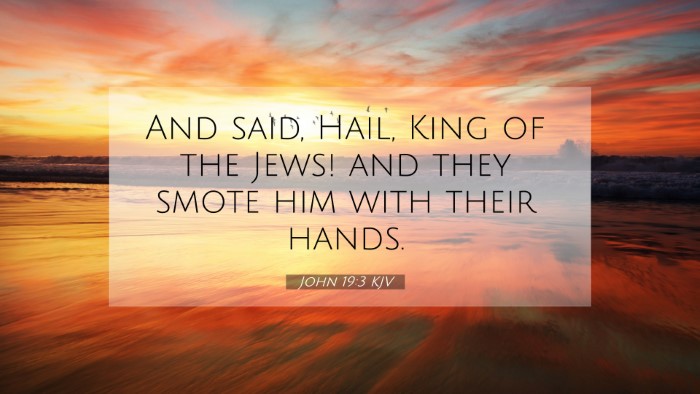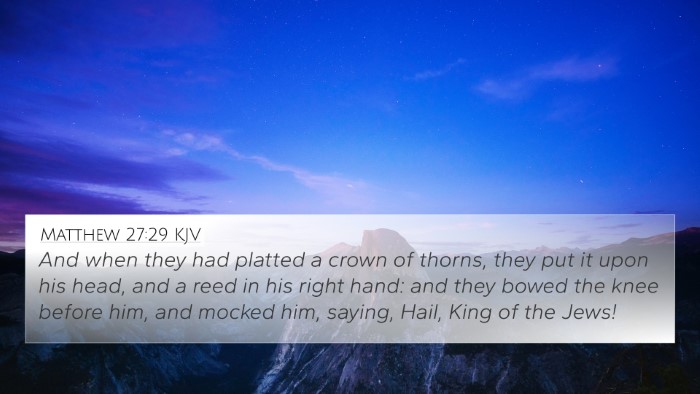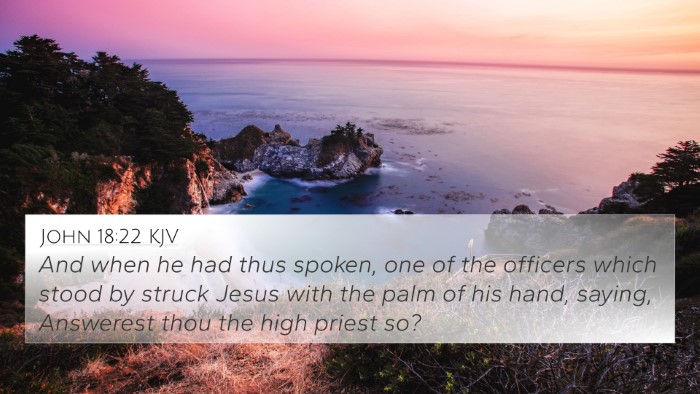Understanding John 19:3
John 19:3 states, "And said, Hail, King of the Jews! And they smote him with their hands." This verse, set against the backdrop of Jesus' trial, captures the mockery and humiliation inflicted upon Him, as well as the profound irony of this derision.
Commentary Insights
This verse has been examined by several public domain commentators to extract its deeper meanings:
-
Matthew Henry:
Henry emphasizes the mockery in this passage, highlighting that the soldiers' greeting of "Hail, King of the Jews!" was a satirical gesture rather than an acknowledgment of Jesus' true kingship. This starkly contrasts with the divine recognition of Jesus as the Messiah.
-
Albert Barnes:
Barnes points out the cruelty and scorn exhibited by the soldiers, interpreting their actions as reflective of the broader rejection of Jesus by Jewish leaders and the people. The physical assault indicates not just a lack of respect, but an outright repudiation of Christ's authority and dignity.
-
Adam Clarke:
Clarke notes the irony in Jesus being proclaimed a king in such a contemptible manner, reinforcing the notion of His unexpected kingdom—a kingdom not of this world, as He Himself stated earlier. This also foreshadows His ultimate triumph over death and sin, emphasized in the resurrection narrative.
Bible Verse Cross-References
John 19:3 connects to numerous other verses that enrich our understanding of the passage. Here are some relevant cross-references:
- Matthew 27:27-31: The mockery by the Roman soldiers extends beyond just verbal insults, as they physically abuse Jesus.
- Mark 15:16-20: Similar to John, this narrative details the soldiers' scorn and the crown of thorns placed on Jesus' head.
- Luke 23:11: Herod and his soldiers also ridiculed Jesus, demonstrating the collective scorn of those in power.
- John 18:33-37: Jesus' discussion with Pilate confirms His identity as a king, albeit a spiritual one, revealing the deeper meaning behind the soldiers' mockery.
- Isaiah 53:3: This prophecy describes the rejection and suffering of the Messiah, paralleling the treatment Jesus received.
- Psalms 22:7-8: The psalmist speaks of being mocked, which prefigures the experiences of Jesus during His crucifixion.
- Philippians 2:7-8: The humility of Christ is emphasized here, demonstrating that even in disgrace, He exemplifies servitude and obedience.
- Revelation 19:16: Ultimately, Jesus is recognized as the "King of Kings," contrasting the mockery He faced in the Gospels.
- 1 Peter 2:23: Peter reflects on Christ's response to suffering, not retaliating but entrusting Himself to God.
- Hebrews 12:2: This verse encourages believers to look to Jesus, who endured the cross, highlighting His perseverance amidst ridicule.
Connections Between Bible Verses
Understanding John 19:3 within the context of these cross-references is vital for grasping the overall narrative of Jesus’ suffering and the mockery that accompanied it. Such connections illustrate the thematic elements of rejection, prophecy, and the fulfillment of Old Testament scripture in the New Testament.
Linking Bible Scriptures
By examining these verses together, we can appreciate how they interrelate, providing a richer understanding of the text:
- Exploring the thematic Bible verse connections between Old Testament prophecies and New Testament fulfillments aids in recognizing the continuity of God’s plan.
- Engaging in comparative Bible verse analysis of passages dealing with mockery and rejection allows for a profound reflection on the nature of Christ’s suffering.
- Identifying the links between the Prophets and Apostolic teachings provides a framework for understanding the significance of Jesus' experiences.
Tools for Bible Cross-Referencing
To delve deeper into such connections, several resources and methods may be utilized:
- Bible concordance: An essential tool for locating terms and concepts across scriptures, facilitating finding correlations like those seen in John 19:3.
- Bible cross-reference guide: A structured approach to understanding how various passages interact with each other.
- Cross-referenced themes in the Bible: Thematic studies enhance comprehension by connecting various biblical instances that echo similar sentiments of humiliation and Christ’s eventual victory.
- Bible reference resources: Online databases or annotated Bibles that provide contextual notes and cross-reference suggestions can enrich personal study.
Conclusion
In conclusion, John 19:3 serves as a powerful reminder of the depth of Jesus' suffering and the scorn He faced. By exploring this verse alongside its cross-references, one can appreciate the interconnectedness of scripture and the overarching narrative of redemption. The insights of respected commentators provide further depth, reminding us of the profound layers within God's word.








